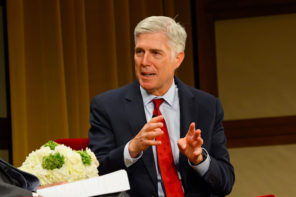When is touching your toes just touching your toes, and when is it an effort to indoctrinate small children in Hinduism?
That is the question that emerged from reporting in the New York Times, Fox News, and the Guardian on the threat of a lawsuit by a group of public school parents in Encinitas, California over a yoga class in a public elementary school.
But the most compelling aspect of the controversy has nothing to do with the religious nature of yoga, or with the fears of parents. Rather, the case raises serious questions about the separation of church and school, and about the many religiously-driven programs that are already active in public education, even in Encinitas. As it turns out, there is so much religion in public education today that the fuss over yoga is like worrying about a stain on your blouse when your trousers are covered in mud.
There are two important ways to think about the issue of yoga—or other potentially religiously-inspired content in public schools. The first test has to do with the content of the program; the second has to do with the connection of the sponsoring organization to the curriculum being presented.
Mary Eady, one of the parents organizing against Encinitas’ yoga program, described to a Times reporter what she sees as religious content: “They’re teaching children how to meditate, how to look for peace and for comfort… It’s meant to shape the way they regulate their emotions.” She characterized the “Sun Salutation,” a basic series of yoga poses in which the student stretches his or her hands to the ceiling, as “a movement sequence that worships the sun god Surya,” and claimed that “yoga, including its physical practice, is very religious indeed.” Her legal representative, Dean Broyles, chief counsel for the Escondido-based National Center for Law & Policy (NCLP), is even more adamant, asserting that the Sun Salutation constitutes sun-worship.
Eady works at a Christian organization called Truthxchange, whose chief mission is to “respond to the rising tide of neopaganism.” Her lawyer’s organization, NCPL, is an affiliate of the Alliance Defending Freedom (ADF, formerly the Alliance Defense Fund), a conservative Christian legal advocacy group that has litigated on behalf of evangelical activity in schools and the broader public square. As might be imagined, the ADF takes a dim view of “neopaganism,” whatever that means to them.
However, if Eady’s and the ADF’s views are correct—that the Sun Salutation and other yoga moves are indeed intrinsically religious—perhaps they have a point.
I put these challenges to the school administrator who runs the program, Assistant Superintendent of the Encinitas Union School District David Miyashiro, who dismissed the idea. “The exercises are not in any way religious,” he told me flatly. “I oversee the development of the curriculum, and I make sure that it is designed to conform with the Presidential Physical Fitness Standards. There is nothing religious about that.”
A problem with the NCPL position might be that they are challenging a practice (a hands-over-head stretch) that isn’t religious in and of itself. The hands-over-head stretch only becomes religious in the context of a larger tradition. In this sense, stopping kids from yoga stretching because it is religious in some contexts makes about as much sense as banning kids from shaving their heads simply because it reminds you of Buddhism.
However, the organizational test raises more serious concerns in this case. Encinitas’ yoga program is partially funded by a grant from the Jois Foundation, which is contributing to teachers’ salaries, curriculum development, and even yoga mats. The Foundation is associated with the family of the late Shri K. Pattabhi Jois, a yoga teacher who popularized a form of yoga called Ashtanga. Mary Eady and the ADF claim that the Jois Foundation is a religious organization. The director of the Jois Foundation, Eugene Ruffin, says it is not.
“Our organization is made up primarily of people who are members of the Abrahamic faiths,” Ruffin told me. But consider the Jois Foundation’s relationship to the K. P. Jois Ashtanga Yoga Institute, an organization whose web page asserts that yoga practice helps to burn away the “six poisons” that surround the “spiritual heart.” Talk of “spiritual elevation” and “sacred beads” does not help the case that this is a non-religious group.
Ruffin insists the two organizations are legally separate, with distinct board memberships. But the Jois family is affiliated with both, and practitioners who have been affiliated with the Institute have also had a voice in the Foundation and its curriculum development. At least one major funding source for the Foundation (donors Sonia and Paul Tudor Jones) has also been involved with the Institute.
So let’s suppose that we are dealing with a group that is in some way tinged with religion. That in itself is not necessarily a deal-breaker: we wouldn’t turn away soup made for the school cafeteria, for example, just because it was made by Lutherans. In my view, the Organization Test really turns on two questions. First, is the program organized in such a way that it is accountable in a real and meaningful way to the school, and not the religious group? Second, does the partnership involve an entanglement between the school system and the religious group that could foreseeably involve state involvement in or endorsement of religion?
In the yoga case, both of these concerns have merit. In this particular instance, though, the Encinitas school district has an effective response to the first concern. The management and administration of the yoga program, the school insists, is internal. Assistant Superintendent Miyashiro, who has no connection with the Jois Foundation, sets the curriculum, helps choose the teachers, and monitors the results. He has the authority and the resources in place to manage the program and ensure that its content and execution it is answerable to the school. The school district has set up a line of accountability that is largely separate from the organization. Once the curriculum is developed, it will be public, rather than belonging to the Jois Foundation, and will be free for any public school to adopt.
The second line of concern is perhaps more difficult. The Jois Foundation has made it quite clear that it sees the program in Encinitas as a beachhead for the eventual development of a much larger program that would put yoga in schools across the country, potentially giving the Jois Foundation a broader influence on public education as a whole.
The Encinitas case is complicated, and a lot depends on specific facts. We can learn more by scouring the landscape for comparable situations. Where do we find public school programs with “possibly religious” content sponsored by religious groups that have a clear religious agenda for the schools?
Oh, that’s easy. You just need to look at the ADF’s client list. Not the ones they’re trying to kick out of the schools, but the ones they are trying to force in.
Consider abstinence-only Sex Ed: the many “health” programs for public middle and high school students teaching that the only way to have a safe and moral sex life is not to have one (outside of heterosexual marriage). Abstinence programs in many cases quite clearly fail the Content Test, presenting themselves as sex education, but delivering messages, though stripped of explicit references to God or Jesus, that are clearly driven by religion and intended to convey religiously-driven values and judgments.
Abstinence programs also, in many cases, more egregiously fail Test Two. Supplied by overtly religious organizations, they are run from beginning to end by outfits like Choosing the Best, the curriculum of which was written by a former Campus Crusade for Christ (now Cru) national director, or the No Apologies program, produced by Focus on the Family. These groups have received hundreds of millions of dollars in federal and state funding to introduce their curriculum to public schools, and their faith-based programs are supported and defended by the ADF and their affiliates. Apparently the separation of church and school is a big deal for the ADF only when it involves the wrong kind of church.
Another example is “Character Education.” Public schools have taken it upon themselves to address issues of ethics and character, but in a world of budget cuts, they often turn to outside providers for the programs. Many of those providers are religious groups whose idea of “character development” is not easily distinguishable from proselytizing. “The Power Team,” “The Strength Team,” “Team Impact,” and thousands of similar faith-based groups send speakers, theater troupes, and even rock bands into public schools ostensibly to teach lessons about drunk driving, bullying, and other valuable topics. But their presentations—which often culminate with invitations to proselytizing events at evangelical churches—soon make clear that their main aim is to leave with a collection of young religious converts.
And when parents complain? The ADF accuses ACLU-backed school districts that seek to limit religious “character education” of waging a “war on Christianity.”
The ADF and its allies also invest considerable efforts in seeking to overturn some anti-bullying school guidelines on the grounds that such policies persecute the “Christian perspective” on LGBT rights and that demanding tolerance is a front for promoting “homosexual values.” Finally, let’s consider fundamentalist Good News Clubs, which are presently in well over 3,000 public elementary schools around the country. Good News Clubs, which are sponsored by an organization called the Child Evangelism Fellowship, are ostensibly after-school “Bible study” programs that require parental permission to join. But that description is misleading. Good News Clubs are not about “study,” they are about religious indoctrination. Further, the clubs produce the false but unavoidable impression in very young children that they are part of the school; they set up shop in public school classrooms immediately after the bell rings, so as to appear a seamless part of the school day. And finally, Good News Clubs instructors tell kids attending the clubs to recruit their peers at school.
It turns out that Encinitas public elementary schools that sparked the national outcry over yoga stretching are rife with Good News Clubs: all nine public elementary schools in the district have a club, reported Assistant Superintendent Miyashiro. And their presence has been made possible by the legal firepower of the ADF and lawyers like Dean Broyles. When it comes to unhealthy entanglement between church and school, a classroom of first-graders stretching their hands to the sky seems to be, for now, a matter of far less concern than the well-organized conservative Christian proselytism that is already making deep inroads into public education.
*This article originally identified the National Center for Law & Policy as the National Center for Policy and Law. RD regrets the error.




